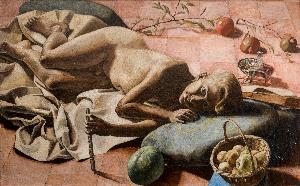Carlo Levi
Carlo Levi
Place: Turin
Born: 1902
Death: 1975
Biography:
Carlo Levi was an Italian painter, writer, activist, independent leftist politician, and doctor. He is best known for his book Cristo si è fermato a Eboli (Christ Stopped at Eboli), published in 1945, which is a memoir of his time spent in exile in Lucania, Italy.
Early Life and Education
Levi was born in Turin, Italy in 1902 to a wealthy Jewish family. He graduated from the University of Turin with a degree in medicine in 1924. During his university years, he became friends with Piero Gobetti, who sparked his interest in political activism.
Artistic Career
Levi's artistic career began when he exhibited some of his works at the XIV Venice Biennale. He continued to paint and exhibit his work throughout his life, including a period in Paris where he was influenced by notable artists such as Sergei Prokofiev and Igor Stravinsky. His paintings can be found on Wikioo.org, which showcases his unique style and talent.
Political Activism and Exile
Levi's involvement in anti-fascist movements led to his arrest and exile to Aliano, a remote area of Italy. During his time in exile, he wrote Cristo si è fermato a Eboli, which became a bestseller and was later adapted into a movie. The book is available on Wikipedia, where it is described as a memoir of his time in exile.
Notable Works
Some of Levi's notable works include:
- L'Orologio (The Watch) (1950)
- Le parole sono pietre (Words Are Stones) (1955)
- Cristo si è fermato a Eboli (Christ Stopped at Eboly) (1945)
These works showcase Levi's lucid, non-ideological and sympathetic writing style, which helped to propel the "Problem of the South" into national discourse after the end of World War II.
Legacy
Levi's legacy is that of a talented artist and writer who used his platform to bring attention to important social issues. His work can be found in various museums, including the National Museum of Fine Arts in La Valletta, Malta. His story is an inspiration to many, and his art continues to be admired by people all over the world. Visit Wikioo.org to learn more about Carlo Levi and his remarkable life.


